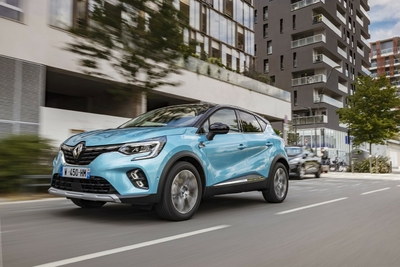-20% on the entire catalog today
Free shipping starting from $18
- Back to home
- You are here : Blog News We tested the new Nissan Juke Hybrid, an SUV with the ECO label that focuses on design and low consumption
We tested the new Nissan Juke Hybrid, an SUV with the ECO label that focuses on design and low consumption
Published by Serge Grenier in News the 10/06/2022 at 09:59

The Nissan Juke was one of the Japanese brand's most successful models in Europe. Just as the Nissan Qashqai was a pioneer in the compact SUV segment, the Juke was a pioneer in the more urban SUV segment, the so-called B-SUVs in the industry, such as the SEAT Arona or the new Toyota Yaris Cross .
The second generation arrived at the end of 2019 with only one engine available: a 117 hp 1.0 petrol 3-cylinder. Today, it finally launches a hybrid version with 145 hp and with an ECO label , the new Nissan Juke Hybrid . We tested it and found out if it was the missing car in the Juke range to get back on the road to success.
The Nissan Juke has been a key model for Nissan's success in Europe. It was on the market for just over 9 years and reached its most successful moment in its seventh year of life, the year most cars are already heading to the starting grid. The previous Juke might even have continued to sell well beyond 10 years.
With this second generation, the brand does not move away from what made the success of the model, acclaimed for its design, either we love it or we hate it. The front design confirms the trend of split optics while the rounded fenders give it a muscular and robust look. At the rear, the design is more traditional. Farewell to the boomerang-shaped pilots, the optical groups are now curiously a classic rectangular block.

The aesthetic changes of the hybrid version compared to the petrol model are minimal. The grille is virtually closed and features black trim on top (now a hallmark of hybrids at Nissan), there are also a number of 'hybrid' logos, as well as new wheel designs.
An interior without changes

On board, the changes compared to the Juke 1.0 are also minimal. The dashboard, analog when almost all its rivals are digital, loses the tachometer and gains a charge indicator and battery power, with indication of the optimal range of use of electrification.
The dashboard also has an 'EV' button to force the use of the electric motor. Finally, in the Tekna finish, the top of the range, the BOSE car audio equipment, now has 10 speakers instead of eight, as in the petrol Juke.

Another noticeable change is the trunk volume. This goes from 422 liters to 354 liters , due to the presence of the battery with a capacity of 1.2 kWh. Basically, it lost the false bottom of the Juke 1.0 and now the trunk floor is at the height of the loading sill.

What doesn't change though, at least in the N-Design and Tekna finishes, is the perceived good quality feeling of the materials. It is an urban and versatile SUV, but the interior is very pleasant and moves away from the interiors where hard and shiny plastics reign. On the contrary, everything conveys a feeling of quality.

The habitability of the car does not change either. There's plenty of room up front and it's easy to find the ideal driving position. Rear-seat legroom remains unchanged. Even the tallest passengers can now travel on board without the risk of claustrophobia, which was not the case with the previous Juke.
A hybrid system with a curious gearbox

Technically, the Juke uses the same hybrid engine as the Renault Captur and Clio E-Tech . This is made up of a 94 bhp 1.6-litre naturally aspirated 4-cylinder petrol engine associated with a 36 kW (49 bhp) electric motor and a 15 kW (20 bhp) high voltage starter-alternator. In total, the Juke Hybrid can count on 145 hp and up to 205 Nm from the electric motor.
The gearbox is the same as on the Renault models. It is a 6-speed automated gearbox without synchronization and with claw coupling (system similar to that of a push clutch), which in competition is known as a "crabot" gearbox (word borrowed from French, like so many others in mechanics ). It has four speeds for the combustion engine and two for the electric motor.

Thus, the Juke Hybrid systematically starts in electric mode and can reach 55 km/h without consuming a drop of gasoline. According to homologation, this reduces fuel consumption to 5.2 l/100 km and CO₂ emissions to 118 g/km. So far the theory. But how does this translate to the wheel?
Driving the Nissan Juke Hybrid

When the car is started, as in all hybrids according to the regulations, it starts electric and will always drive electric up to 55 km/h, if the state of the battery allows it or if it is not used more than necessary ( steep slope, air conditioning in hot weather, hard acceleration). In any case, below 10 km/h the petrol engine will switch off automatically and it will only move with the electric.
Once underway, the car's smooth ride is positively surprising. The transition between electric and combustion engine is the smoothest on the market, there is no vibration, jolt or sound eruption of the gasoline engine. We still hear the start of the gasoline engine, but it remains relatively discreet.

The extremely smooth ride is also noticeable when changing gears. It's nearly impossible to tell when the transmission is upshifting or downshifting. In practice, it seems that the motor acts only as a generator - which it does not - and in the end it offers almost the same smoothness of operation as an electric motor . All this thanks to the non-synchronised gearbox, which is operated by the alternator-starter motor.
The general softness is slightly altered by the suspensions which seem a little harsh in town, at low speed. They are even a little dry when passing the wicks. This is the corollary of having to carry 90 kg more compared to the Juke 1.0 due to the electric motors and the battery. It is particularly visible in the rear seats, since the battery is located under the trunk.

Although on a deteriorated surface in town it can be somewhat annoying, on the road this firmness is appreciable. The car has poise, is well guided (the steering is also a little harsher than in the 1.0, but that's appreciable) and in no way diminishes comfort.
Another positive point of the hybridization compared to the 1.0 model is the greater vigor of the flow of circulation which allows the instantaneousness of the motor torque of the electric unit. Although the Juke with the 117bhp engine and automatic transmission felt too sluggish to shift freely, that feeling disappeared with the hybrid version.

This is something particularly remarkable in the city where the immediate delivery of the electric motor works wonders below 50 km/h. It's not a sports car, of course, but, on top of that, the Hybrid has improved its 0-100 km/h time by 2 seconds, bringing it down to 10.1 seconds. It is an era that places him at the level of his possible rivals.
In addition to its smooth ride, the Juke is distinguished by its regenerative braking and the good sensations it provides to its driver. It has the e-Pedal function as standard, which makes it possible to dispense almost completely with the brake pedal in town. Just by removing your foot from the accelerator, the car "brakes on its own", until it reaches 5 km/h. Be careful, you still have to press the brake for the car to come to a complete stop.

But this regenerative braking, which all hybrid cars have, usually doesn't go well with physical braking, that of the brake discs, and often the braking is strange with an apparent loss of bite as the electric motor stops braking the car. car and the brake discs take over.
In the Juke Hybrid, unlike many hybrids, braking feels natural . There is not this strange feeling of lack of initial bite and suddenly, when the physical brakes act, there is more braking. Not here, the Juke has powerful regenerative braking that feels like you're braking with bite and when the physical brakes take over there's no noticeable difference.

This is partly due to the presence of an iBooster , made by Bosch. It is an electromechanical brake fluid booster that improves braking power without reducing kinetic energy recovery from the brakes.
In most hybrids, the feeling of little bite is due to the system favoring energy recovery rather than power shutdown. With the iBooster, you get braking power and kinetic energy recovery.
Until now, the Juke Hybrid displayed a much more interesting proposal than the petrol version. And it doesn't disappoint in the key section in a hybrid, fuel consumption.

Despite a route offered by Nissan in which there were more highways than urban roads, and a waiter generally does not have a light right foot, consumption was quite parsimonious, throwing an average of 5.9 l/ 100km.
With a car with more mileage (the test unit had only 600 km), no doubt it is possible to approach 5.5 l/100 km. It is a consumption significantly lower than that of the Juke 1.0 and similar to that of a Hyundai Kona HEV, less refined in its operation than the Juke.
Nissan Juke hybrid, price

The new Nissan Juke Hybrid is already on sale in Europe . And their prices start at 31,500 euros with the N-Connect finish and end at 34,200 euros for the Tekna finish, which includes the e-Pedal system as standard, the very efficient ProPilot (level 2 autonomous driving system), the navigator and the 10 -speaker BOSE audio system.
|
MODEL AND FINISH |
THE PRICE |
|---|---|
|
Nissan Juke Hybrid N-Connect |
€31,500 |
|
NISSAN JUKE HYBRID FIRST EDITION |
€32,350 |
|
NISSAN JUKE HYBRID N-Design |
€32,450 |
|
NISSAN JUKE HYBRID Tekna |
€34,200 |
On the occasion of the launch, Nissan is offering a limited series of 180 units for France of the Nissan Juke Hybrid called 'Première Edition' for 32,250 euros. Based on the mid-size N-Design trim, it features leather upholstery with contrast stitching, a custom two-tone roof and specific alloy wheels.
Post a comment
Order safely
Quick delivery
By your side 7 days a week !
14 days to change your mind
Subscribe to the newsletter



